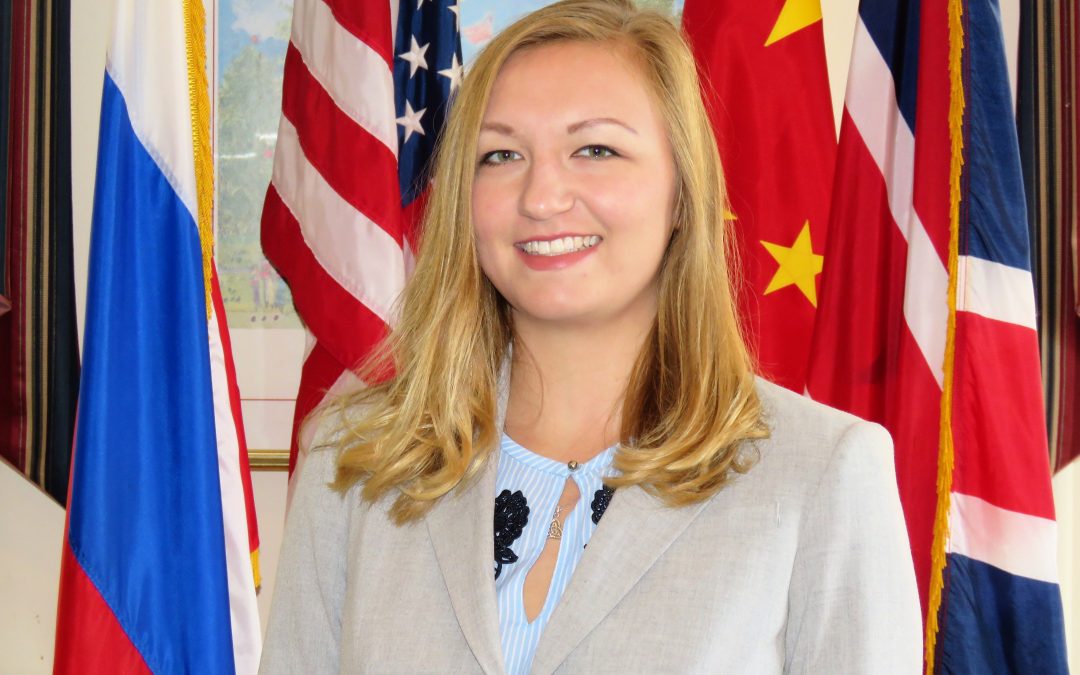
by Madison McHugh | Dec 13, 2017 | Internship Experiences, Undergraduate Students
My name is Lindsay Smetanka, and I am a senior at Seton Hall University majoring in Diplomacy and International Relations with minors in Arabic and Catholic Studies. I worked at International Crisis Group in New York City as a Government and Foundation Relations Intern. International Crisis Group is an independent, non-profit, non-governmental organization committed to preventing and resolving deadly conflict. Through field analysis, field advocacy, and policy suggestions, Crisis Group directly handles crisis and educates decision makers on future steps to resolve conflict happening throughout the world.
My day-to-day activities included tracking grant obligation outputs (advocacy meetings, reports, and briefings), working on database management projects, engaging with donors, and researching donor prospects. I was most interested in advancing Crisis Group’s monitoring and evaluation method to accurately measure the impact that the NGO’s outputs have in the international system, especially in areas experiencing crisis. With the rise of social media and technology, international NGO’s need to advance as well by using these methods to track who is viewing their content, where and if it is making the impact originally proposed, and how to improve engagement with donors and stakeholders. My coursework prepared me to think critically, write concise briefs, and meet deadlines. I learned how the grant-writing process works and how to communicate with professional contacts.
I believe that my internship has assisted in my goal to obtain a position as a development officer after graduation. Many jobs in the field require applicants to have experience with prospect research, Raiser’s Edge, donor engagement, and project management – all of the skills that I gained at Crisis Group. In addition, the internship exposed me to networking events and seminars in the city that helped me understand the non-profit development field better. As my first “big city” internship, it was definitely intimidating at times. The biggest challenge I faced as an intern was feeling like a small fish in a big ocean. When I first started, I doubted my qualifications, but after spending more time around my coworkers and the office culture, I became more comfortable and confident.
Some advice I can offer is that asking questions is an integral part of an internship, whether asking experienced professionals about their education and job history or asking coworkers about administrative processes. I gained knowledge through asking about something that I did not know or fully understand. In addition, networking in the office is essential to making the most out of the experience. Talking to coworkers on coffee and lunch breaks can open up new opportunities and help create working friendships. It also helps create a team mentality within the office, which is so crucial in a non-profit organization. I always left the office feeling confident that I helped advance the Crisis Group’s administrative process and mission. This feeling was the most rewarding part of my internship. I would definitely recommend this internship to my peers, as well as additional internship positions within Crisis Group.
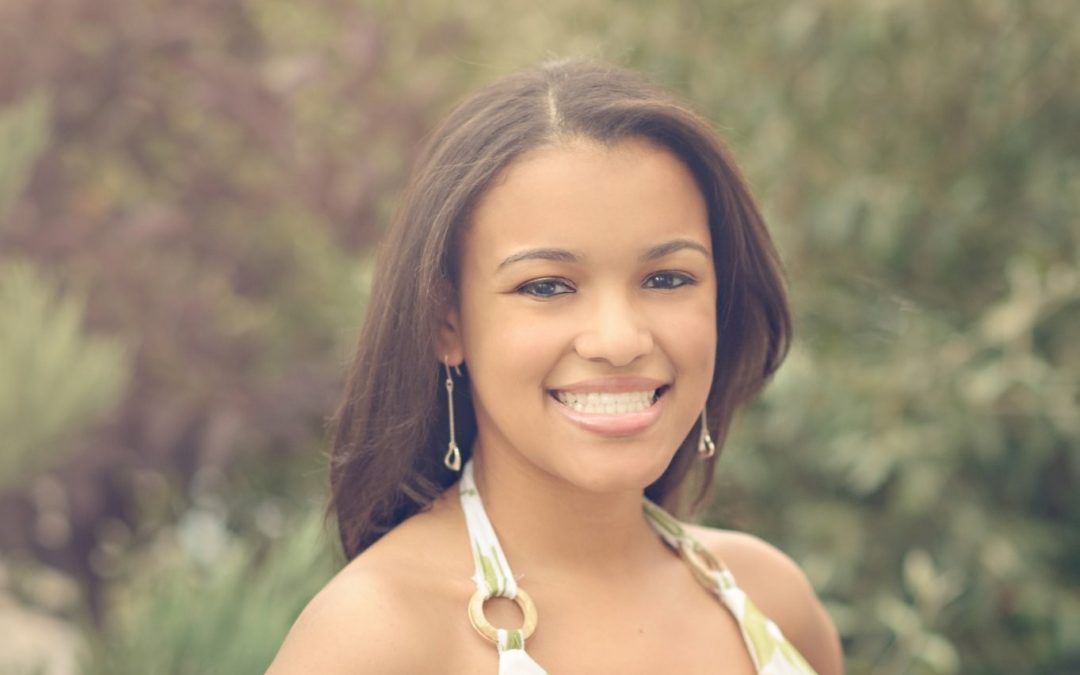
by Madison McHugh | Nov 29, 2017 | Graduate Students, Internship Experiences
My name is Marissa Hutton, and I am currently a second year graduate student completing a dual degree in Diplomacy and International Relations and Strategic Communication. During the summer of 2017, I interned at an international communications firm, BLJ Worldwide in New York City. Daily responsibilities varied, but over the course of a week, I would typically produce memos on a variety of topics, create and manage databases of contacts and edit different pieces of writing.
The great thing about BLJ is that it was rare for interns to be tied down to a single project all day. The firm’s numerous clients meant that interns completed multiple tasks in a day and utilized different skill sets to assist the account managers. Even the smallest task of gathering contact information could become a springboard for an account manager to set up vital meetings for clients that could have long-term effects on their business. That was one of my favorite parts of being in the office: no job was too small and everyone appreciated the work done for them.
In terms of diplomacy, my internship required that I write, analyze, and conduct research on multiple current events each day. Our work tended to focus on diplomatic hot spots and areas that are sources of much discussion and analysis for a diplomacy student. Each day, interns ventured into Google News to pull any media mentions in order to create a report that illustrated the “public mood” in a 24-hour period. Due to international events at the time, some clients received an extensive amount of coverage, which then required me to conduct research on the media outlets and institutions discussing them, a process that exposed me to important influencers in the media and academia.
I also found that a large number of the case studies I was asked to analyze in my courses help me complete tasks in my internship. In my communications courses, these studies gave me a bank of examples to look back upon and draw new conclusions from, whereas in my diplomacy courses, the case studies provided me with important background information and policy analyses that I drew upon in writing memos for clients on diplomatic matters and institutions.
In terms of my career choice, this internship provided me with an answer to that ever-looming question: is this really what I want to do with my life? Thankfully, that answer was a resounding yes. My elders always said that if you are able to find enjoyment in all aspects of your career, then you never truly ‘work’ a day in your life. That is what I discovered about myself through my work at BLJ. I sincerely enjoyed everything from media monitoring to editing to the endless amounts of reading required to stay on top of the game. While my past internship experiences provided me with professional skills and knowledge, this one gave me much more: experiential confirmation that I made the right choice.
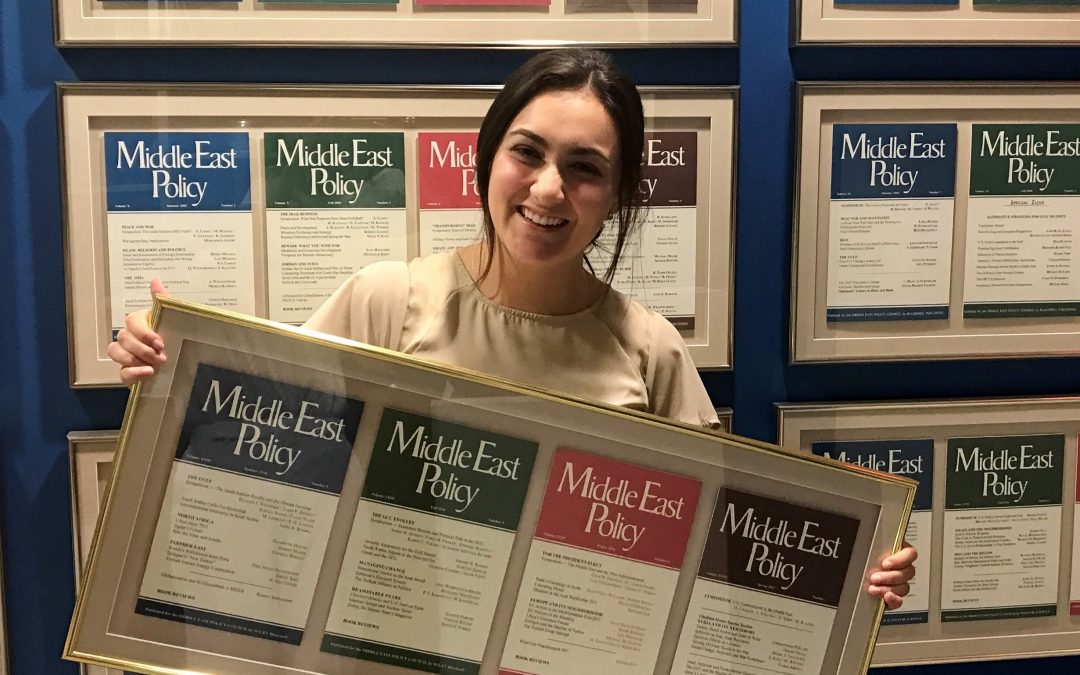
by Madison McHugh | Nov 15, 2017 | Internship Experiences, Undergraduate Students
My name is Gabrielle (Gabi) Hunt, and I’m a rising senior studying Diplomacy, Environmental Studies, and Arabic at Seton Hall. I wanted the organization I interned with this summer to involve work synthesizing all of my interests. Ultimately, I decided on Middle East Policy Council (MEPC) in Washington, D.C., and I could not imagine a better fit.
MEPC is a nonprofit think tank that focuses on education and advocacy work in Middle East issues. It publishes the leading Middle East affairs journal, Middle East Policy (MEP), hosts quarterly Capitol Hill conferences discussing current events, and has an educational outreach branch, TeachMideast, designed to make Middle East issues more accessible to K-12 teachers and students.
I was one of two interns at MEPC who dealt broadly with educational outreach, event coordination, and social media management, along with inputting edits and proofreading articles to be published in MEP. I also wrote a few of my own pieces on current events and completed a 10-week independent project with my fellow intern. For our project, we started a video series aimed at capturing the lives of Arab-Americans around the D.C. metropolitan area. The topics of their interviews typically encompassed how their professions, interests, and passions relate to their cultural identity.
In addition to the larger project, I conducted a series of small projects throughout the weeks – like writing TeachMideast focus pieces – which brought together my interdisciplinary interests. With focus pieces in particular, I was given the opportunity to write about anything I found interesting – from the Saudi Vision 2030 plans to reducing dependency on oil, to the origins of the Boycott, Divestment, and Sanctions movement.
I loved my 10 weeks working at MEPC, especially because I was given so much opportunity to be creative through self-guided projects. Through independent work, I strengthened my professional development and time management skills. I also enjoyed my inclusion in the publication process of MEP, not only because of my interests in writing and editing, but because the responsibility of accurately inputting edits and proofreading fine-tuned my attention to detail and precision. My favorite part about MEPC is that I always felt like a valuable team member whose input was valued.
Overall, I could not be happier with the senior leadership internship experience I had, and the time I was able to spend working in D.C.
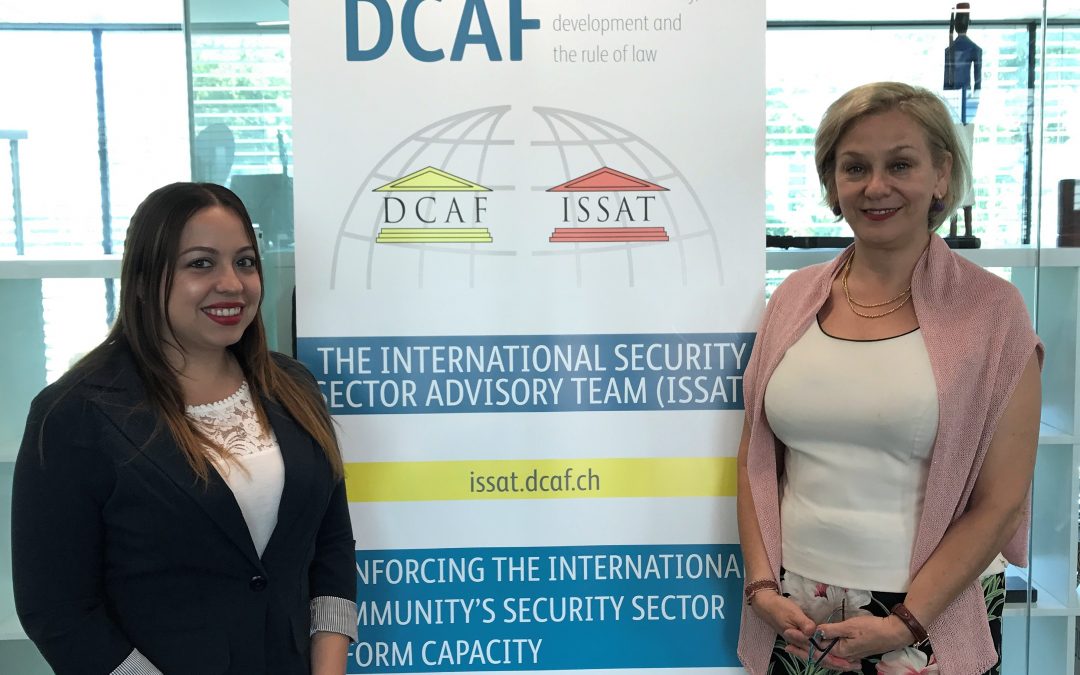
by Madison McHugh | Nov 1, 2017 | Graduate Students, Internship Experiences
My name is Marisela Rivera, and I am a Master of Arts candidate at Seton Hall`s School of Diplomacy and International Relations. Over the summer I had the pleasure of serving as the Sergio Vieira de Mello Fellow for the Geneva Centre for the Democratic Control of Armed Forces (DCAF) in Geneva, Switzerland, the international capital of the world. The fellowship honors a former United Nations Diplomat, Sergio Vieira de Mello, who was killed in the Canal Hotel bombing in Baghdad, Iraq in 2003. Mr. Vieira de Mello is remembered for his long and distinguished career with the UN as well as his efforts to promote peace, human rights and humanitarian aid.
Like Mr. Vieira de Mello, I am passionate about fulfilling peace and security for all. I specialized in two eminent concentrations to promote peace and security: International Law & Human Rights and International Security. My two specializations and my keen interest in Latin America have well prepared me for the fellowship. My host organization, DCAF, is an international foundation that is well-known for its support of security, development, and the rule of law.
Within the DCAF, I worked for the International Security Advisory Team (ISSAT). ISSAT was created to increase the capacity of the international community to support Security Sector Reform (SSR) processes, enhance the effectiveness and quality of SSR programming, and facilitate the coordination and coherence of international assistance for nationally-driven SSR processes. It focuses on four key services: advisory field support, training and capacity development, knowledge services, and advocacy and outreach.
Prior to my arrival, DCAF created a Latin America and Caribbean (LAC) department dedicated to Security Sector Reform. I worked with the director to set the foundation and sustainability flow for this particular department. Together, we created a strategy for LAC, as well as an overview of donors to the region. I utilized my social media and advertising skills to create a memorable LAC webpage, and I wrote country background notes, particularly in Latin American countries. In addition, I was tasked to develop a knowledge product for the Gender and Security section that applied a gender lens to explore the application of local ownership in SSR. The case study analyzed two countries and explore the lessons learned to increase the discussions on Women, Peace, and Security (WPS).
One of the most challenging and gratifying experiences was familiarizing myself with international security and human rights dialect in Spanish. Being of Colombian descent, Spanish is my first language. However, growing up in America and being part of the public education system, Spanish was not a priority. Through DCAF, I learned the importance of bilingualism and the various opportunities that it brings.
Overall, my time with DCAF was insightful and rewarding. I fulfilled many assignments in my area of study, and I was trusted with the duties of a Project Assistant as well as the work of an SSR Officer. My position at ISSAT offered first-hand experience in SSR, specifically in the international security aspect of my career. Given that this is the second year the Sergio Vieira de Mellow Fellowship was offered to a Seton Hall Graduate student, I would highly recommend my fellow peers to apply for this position in the future, and I know I will cherish the knowledge and experience gained with DCAF forever.
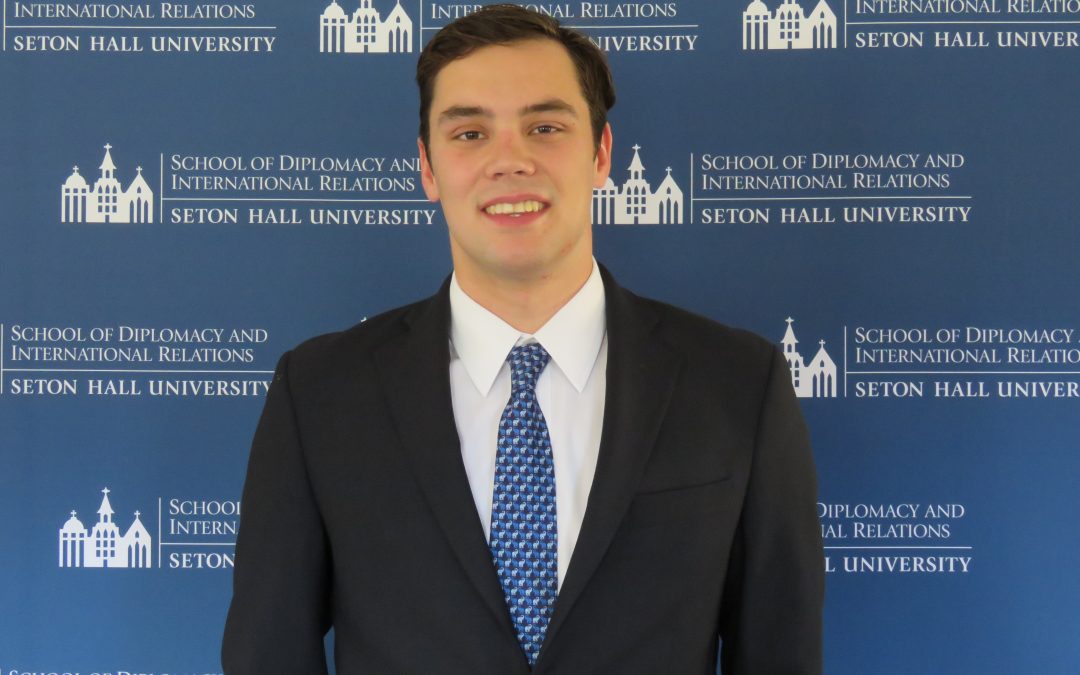
by Madison McHugh | Oct 18, 2017 | Internship Experiences, Undergraduate Students
My name is William Smith, and I am studying Diplomacy and International Relations at Seton Hall. Over the summer, I had the opportunity to intern with Waterfront Development Corporation Limited, a crown corporation tasked with ensuring the prosperity of waterfront areas in my home province of Nova Scotia, Canada. Waterfront areas are extremely important to the coastal area of Nova Scotia, making their prosperity crucial to the success of the province’s tourism industry.
My responsibilities related primarily to the promotion and execution of the corporation’s major summer event, the 2017 RDV Tall Ships Regatta. The regatta is a 7,000-nautical-mile sailing race in which spectacular vessels, known as tall ships, make their way from country to country over the course of the summer. The regatta makes 10 stops in different ports across the province, representing major tourism opportunities for the host ports. The race is heavily promoted as a spectator event as the ships themselves are attractions in their own right. However, there are opportunities to actually sail aboard the majority of the ships visiting as well.
Due to the lack of publicity, I was specifically tasked with creating interest in the sailing opportunities in order to make the event successful as an experiential one as well as a spectating one. To meet the expectations of my tasks, I collaborated with television and newspaper professionals in order to promote the events and sailing opportunities to the general public. I also interacted with some of the crew members of the ships that appear in the regatta who provided me with more information to better promote the experiences that exist. I realized that while television and newspaper promotional activities were beneficial in increasing awareness for the general public, in order to be most effective, I also needed to identify and contact target groups, a task that took up much of my time over the summer.
The opportunity to assist in promoting my home province’s attractions, particularly through a large international event like the Tall Ships Regatta, was extremely rewarding as I recognized the value of bringing the event to fruition for the sake of the province’s success and gained valuable event-planning and management experience.
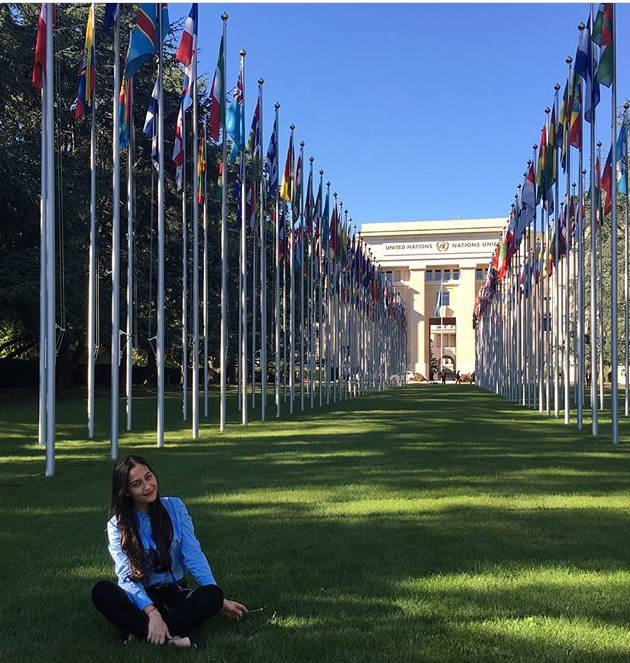
by Madison McHugh | Oct 4, 2017 | Graduate Students, Internship Experiences
My name is Isabel Deluna, and I am a Diplomacy student at Seton Hall. Switzerland was wonderful: being surrounded by multilateral organizations and diplomats from all over the world made my internship at the Dominican Republic Mission to the UN very interesting. Over the summer, a new Ambassador to the Dominican UN was chosen, and I spent much of my time preparing for his arrival by renewing and updating systems and archives.
At the mission, my primary responsibility was to prepare two types of reports for the Minister of Foreign Affairs at the Dominican Republic following UN meetings. We reported verbal notes for the United Nations to notify of activities or requests, as well as “oficio” reports, which were special reports sent to the Dominican Republic to inform the Ministry of Foreign Affairs of mission developments and changes in events or circumstances. I prepared each report with the information provided and entered them into the record system. Everything at the mission must be put on their record, and the reports were vital to fulfilment of the mission. In addition, I frequently assisted during United Nations sessions and meetings with Dominican Republic participants, helping active participants and observers alike.
I believe the internship helped me to build my professional network. I met a great many Ambassadors and diplomats from multiple missions in Geneva who shared their experiences with me and made recommendations on strategies for my future career. I believe it is important to know the missions’ systems as well as how they manage their representation at the United Nations.
I attended sessions that related to a variety of important topics, including migration, human rights, and indigenous groups. The sessions had a great impact on me, because I was able to see the way diplomats interact with each other and express concern and defend certain topics for the benefit of their respective countries. I feel I gained an understanding of their knowledge and strategies, and thus I learned how to think strategically and manage my expression of my opinions. I believe I can apply much of what I learned in future classes and discussions.
Throughout my internship, I gained skills that will help me ascertain my position on topics of importance as well as maintain and defend it, which amplifies my ability to analyse problems and situations on diverse topics. I am very grateful I was given the opportunity to improve my skills in a direct, diplomatic setting, and I would especially recommend the internship to those who are interested in the UN!
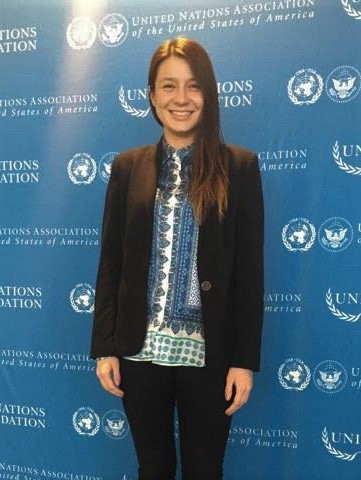
by Madison McHugh | Sep 20, 2017 | Internship Experiences, Undergraduate Students
My name is Daniela Uribe, and I am a senior student of Diplomacy and International Relations from Seton Hall University. I am from Colombia and moved to the United States four years ago to pursue my college education. As part of my learning experience at Seton Hall, I had the chance to intern at the Consulate of Colombia in New Jersey for seven months. The Consulate of Colombia is a government organization that represents and assists its nationals in international territories in order to provide legal assistance, notarize documents, and protect the interest of its citizens.
I decided I wanted to intern at the Colombian Consulate because the country was beginning a new development in its national security since the government’s negotiation and national referendum with the largest terrorist group in the territory, Las FARC. Since the Consulate represents the government of Colombia in the U.S., its role in this development was to organize, educate, and prepare nationals to participate in the referendum. Thanks to this call I was able to start interning at the consulate the week after I applied.
There was a lot of work to be done. As a Consular Intern, I assisted government officials in their consular assignments and assisted nationals with processes such as voting and serving as judges the day of the referendum. In addition, I contacted nationals and spoke effectively about the importance of participating in the referendum, including clarifying inaccurate information. One of the common questions was about viability to vote – whether one fulfulls the requirements set to vote. The National Registry provides ID numbers for nationals to vote in a specific place, and they needed to be informed of the location.
Another large role I played was educating people about the agreement. The agreement was 150 pages, and I needed to know it very well. If I had not studied Diplomacy and International Relations, I would have not been able to understand the type of language the document contained.
Dr. Tinker’s Public International Law course taught me about the importance of language in this type of document; how it could have different interpretations from different parties and how it becomes binding; how much responsibility each party has and the mechanisms of implementation. My class experience prepared me to raise questions and pose concerns during training times and participate in scholarly discussions during the preparation period.
After this experience, I was able to better understand the role and challenges of the consulates and government officials. They cannot advocate for a specific vote, but they must provide all the tools to inform the public to decide freely and support them throughout the process.
I enjoyed every second of the experience. I worked so hard, it felt like a full-time job, but I also learned so much about government and public diplomacy. We also faced challenges, too, during the vote: people showing propaganda, adding extra votes, or voting when they were not registered. It was very interesting being both central to the event and behind-the-scenes.
After the vote, I was selected to help tally the votes and upload the results for New Jersey. It was an honor and privilege to serve my country in this way.
I felt that this was my real job (even while unpaid!) in many ways, but the quality of learning I received from this experience made it so worthy.
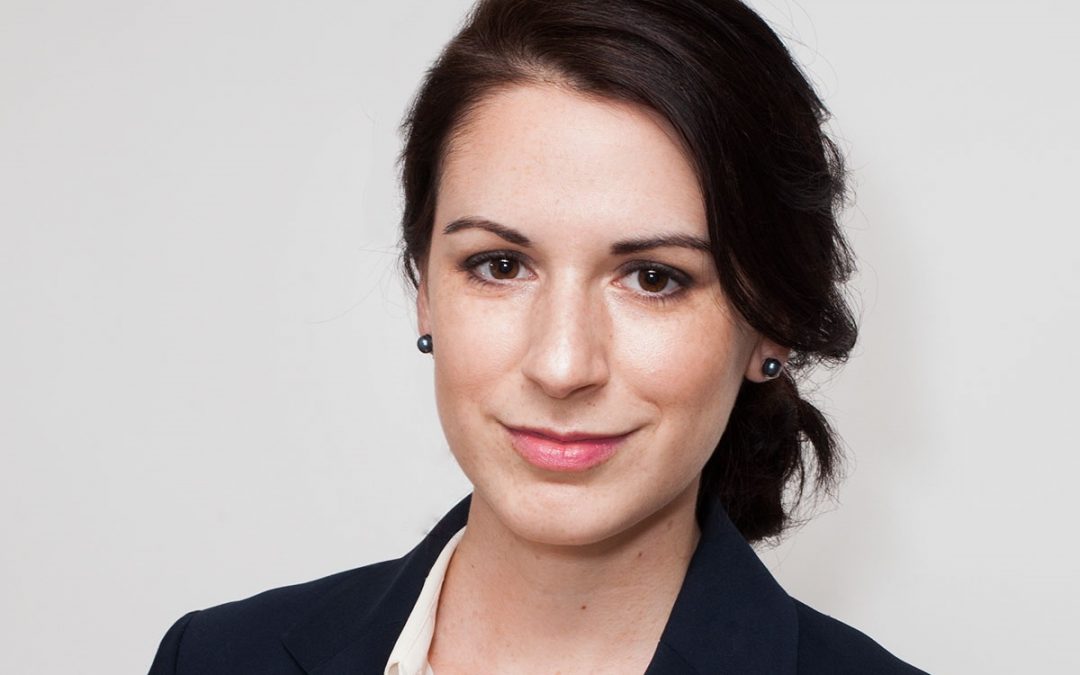
by Catherine Ruby | Jun 6, 2017 | Graduate Students, Internship Experiences
Emily Fox, M.A. May 2017
Carnegie Council on Ethics in International Affairs Internship
This spring, I had the opportunity to intern with the Carnegie Council on Ethics in International Affairs (EIA). I worked for Ethics & International Affairs, a journal publishing articles on current normative and ethical issues in foreign policy and international relations. One of my duties as an Editorial Intern was to act as the first point of assessment for all incoming submissions. In order to succeed at this task, I needed to have not only a strong theoretical background, but also a degree of familiarity with a wide array of current events. Thankfully, the School of Diplomacy has prepared me for these topics.
One of the most prominent debates in international relations ethics regards the policy and principle of the Responsibility to Protect, and many of the submissions I reviewed dealt with this topic. The knowledge I gained at the School’s United Nations Summer Intensive course was incredibly valuable for formulating assessments of these articles. Being able to hear firsthand from experts such as Hugh Dugan and Ed Luck really strengthened my background on the complexity of these issues and the opportunities and constraints the UN must navigate.
My skills in writing and editorial judgement were strengthened considerably by this internship, and I expanded my knowledge of international affairs by reading articles and essays by scholars. I learned a great deal about publishing and the peer-review process, and am able to participate and contribute in high-level meetings. Though I was lucky to have several years of professional experience prior to being hired at EIA, I have found that each professional environment teaches me something new about organization, communication, and workflow.
Should I choose to pursue a career as an editor, I will be prepared as my internship with EIA taught me a great deal about the requirements and challenges in the field, and has shown me the best practices for working through different stages of publication. As an intern, I often juggled several projects at once. My team at EIA was ready to provide guidance on prioritization and organization, which allowed me to complete my tasks efficiently without sacrificing quality.
The assignment I was most excited to complete at EIA was my book review. Each intern is invited to contribute a short review of a book of their choice for publication online and in the print journal. Because I could choose my book, I was able to pick something in an area in which I am interested. Not only was I able to read a book that interested me, but I also gained valuable writing experience from the exercise.
During my time at the internship, I tried to incorporate feedback whenever possible and volunteered for additional work when able. While I still have many opportunities for improvement, I think that applying these principles helped me to be successful thus far.
I would highly recommend my internship to others. The Carnegie Council is an excellent institution and a great place to be connected to. My coworkers have made me feel like a true member of the team, and their advice and guidance has been incredibly helpful for my professional development.
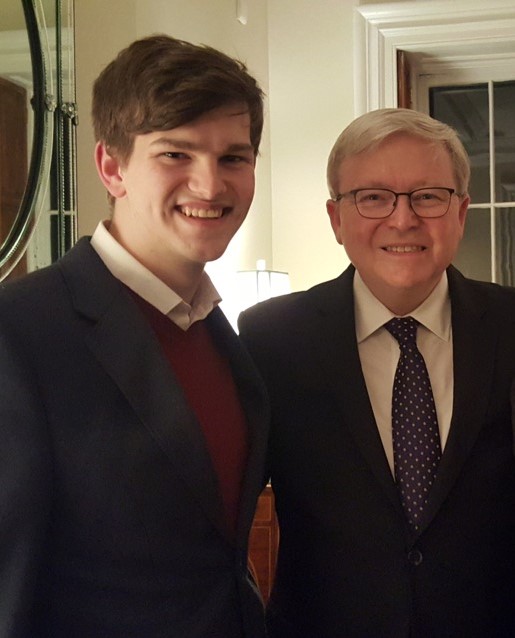
by Thomas Ashe | Feb 6, 2017 | Graduate Students, Internship Experiences
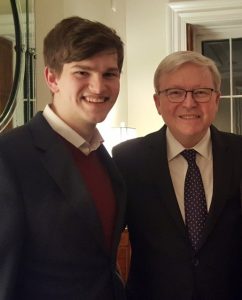
My name is Kevin Princic. I worked as an intern at the Asia Society Policy Institute in New York City. At Seton Hall University I am a second year graduate student pursuing a Master of Arts Degree in Diplomacy and International Relations with specializations in Foreign Policy Analysis as well as Global Negotiation and Conflict Management.
When applying to attend Seton Hall University’s School of Diplomacy and International Relations, I decided that one of the main goals of my graduate studies would be to branch out in my region of interest, Asia. I have studied Japan and China quite extensively; however, my knowledge of the rest of Asia was quite limited in comparison. With this goal in mind, I began my studies at Seton Hall but little did I know that my ambitions would lead me to an internship of a lifetime. At the School of Diplomacy and International Relations’ orientation, I first heard about the Asia Society from a colleague. She raved about her experience and encouraged me to apply for a position. This summer I took the plunge and applied to the Policy Institute and was so fortunate to receive an internship offer for the fall semester.
My work at the Asia Society Policy Institute has been instrumental in achieving my goal of becoming a well-rounded Asia scholar. One of the core responsibilities for interns with the Policy Institute is to conduct a press scan every day. Every Monday I began my day with a cup of coffee and several dozen news stories spanning all across Asia. It was duty to isolate the relevant stories, summarize them, and compile a list separated by sub-region. The final press scan usually contained around thirty different news articles. This task alone was instrumental in achieving my goal. Although I only completed the press scan on Mondays, I received it every day of the week from the other interns as well. This is just one of many instances in which the Asia Society is a full immersion learning experience.
I found that on more than one occasion that my work in the classroom at Seton Hall relates directly to my work at the Asia Society Policy Institute. For example, I was tasked with preparing a brief on North Korea’s nuclear programs and finding any related data. From my personal research I knew that this type of information was scarce due to North Korea’s isolationist nature. However, my relentless search proved fruitful for both myself and the Asia Society. The data I found helped me make progress on formulating my research design which will eventually become my Master’s Research Project and allowed me to provide a thorough brief to the Policy Institute. This is just one of many instances in which my work at the Asia Society and at Seton Hall intermingled.
The Asia Society Policy Institute is a think/do tank which makes it a little different from the typical think tank. My favorite aspect of the Policy Institute is its hands on approach to policy challenges in Asia. The Asia Society is also well known for its programming, bringing in prominent guests to speak on their research or practice. I was lucky enough to be working at the Asia Society as it held its United Nations General Assembly event series. During this series I assisted with events on topics ranging from North Korea’s nuclear program featuring both scholars and policy practitioners, to a dialogue on the Association of Southeast Asia Nations (ASEAN) 50th anniversary featuring delegates from several ASEAN states. The Asia Society even hosted the leader of Myanmar, Aung San Suu Kyi, who spoke on her efforts to democratize the country and reopen it to the world. Learning from these influential people through these events has been a truly unique and enlightening experience.
My experience at the Asia Society made me feel as though I am a part of something bigger that is having an impact in not only the United States, but also in Asia and even throughout the entire world.
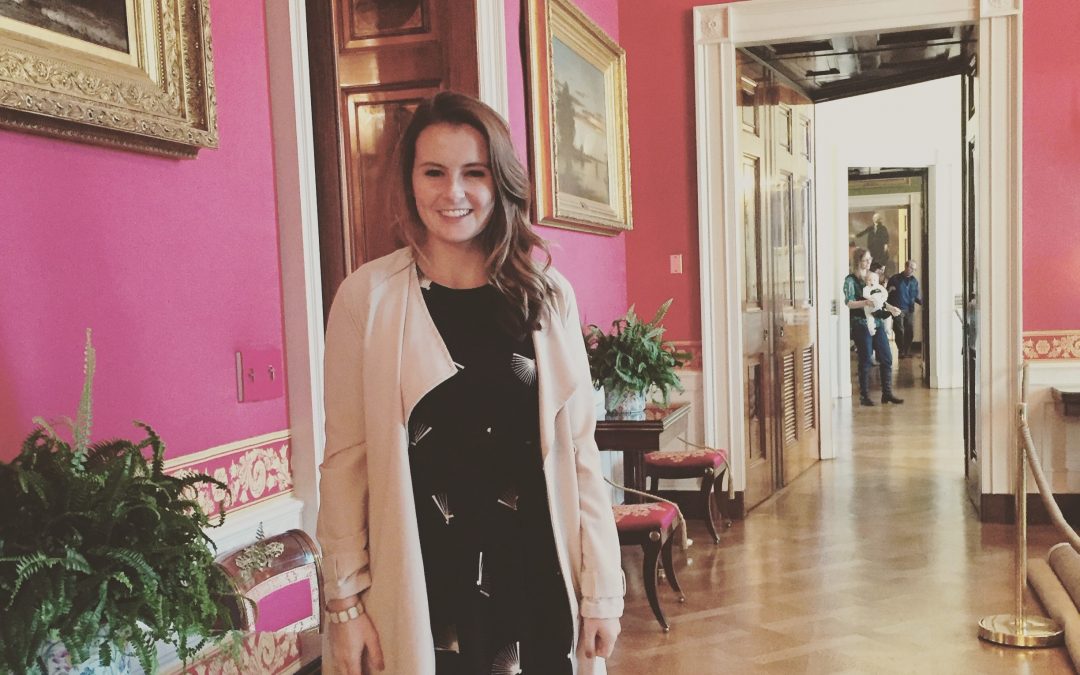
by Thomas Ashe | Feb 6, 2017 | Internship Experiences, Undergraduate Students
My name is Courtney Boland. My experience living and working in Washington D.C. was an eye-opening experience. At the United States Agency for International Development (USAID), I participated in projects that extended throughout the world, all with the overarching goal of ending extreme poverty and promoting resilient societies. In the Bureau of Legislative and Public Affairs, I worked with several different departments and witnessed the wide range of agency operations.
Right from the beginning, I dove right in to support the agency’s work at the United Nations General Assembly (UNGA). I worked previously at the UNGA during my time as an intern at the British Consulate General in New York City so I was able to smoothly transition into my new role. Furthermore, when Hurricane Matthews devastated the Caribbean, specifically Haiti, I had the opportunity to see how USAID responded to natural disasters and humanitarian crises. This was a particularly enormous task for the Public Affairs team. All the staff members, including myself, had to ensure accurate information was disseminated out to the public and to USAID’s mission in Haiti as quickly as possible. I gained first-hand experience in the preparation and “war-room “style of operations for disasters.
While all the work I contributed to at USAID has been exciting, the most rewarding was working for First Lady Michelle Obama’s Let Girls Learn initiative. I always admired her global campaign to bring education to 62 million girls who are currently not enrolled in school. The experience to support that mission was certainly very surreal. I tailored my academic studies to gender equality and the importance of female education, which served as key issues of interest for USAID. I assisted in strategic communications for the premiere of The First Lady’s CNN documentary “We Will Rise,” which focused on her trip to Liberia and Morocco where she met with Let Girls Learn beneficiaries. I also visited the White House with my supervisor to meet with our FLOTUS Office counterparts and was even given the opportunity to have a tour of the White House — a D.C. dream come true.
Working for the U.S. government provided me with the opportunity to learn more about the inner-operations of the federal government. Additionally, I witnessed how government agencies prepare for transition from one administration to another. I did not realize how intensive it is and how many people actually leave the agency once President Obama’s administration comes to an end. This is important for me to experience especially if I plan to work in the U.S. government again one day. This experience made it ever more clear to me that I want to continue to work in Washington D.C. following graduation in May.











